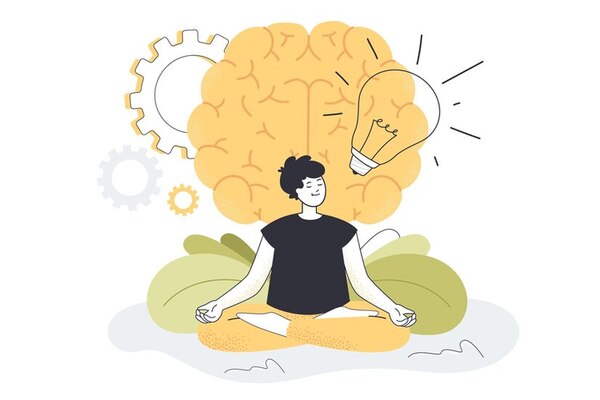
In our modern whirlwind of existence, the threats of anxiety and depression have gained a formidable foothold in our lives. The stressors of modern life, combined with the pressures of work, relationships, and daily responsibilities, can take a toll on our emotional well-being. While conventional treatments such as therapy and medication have their merits, many people are seeking natural and holistic approaches to address these challenges. Ayurveda, an ancient system of medicine originating from India, offers a unique perspective on mental health and provides natural remedies to manage anxiety and depression effectively.
Understanding Ayurveda for Mental Health
Ayurveda, known as "the science of life," stands as a time-honoured holistic system of healing, with a lineage of thousands of years in practice. It emphasizes the interconnectedness of mind, body, and spirit, viewing health as a balance between these elements. In Ayurveda, mental health is as important as physical health, and both are considered integral to overall well-being.
According to Ayurvedic principles, imbalances in the three doshas—Vata, Pitta, and Kapha—can contribute to mental health issues. Vata imbalance, for example, can lead to anxiety, while excess Pitta may result in irritability and anger. Kapha imbalance, on the other hand, can lead to feelings of heaviness and lethargy, common in depression. Ayurvedic treatments aim to restore balance to these doshas, promoting mental and emotional equilibrium.
Anxiety Relief through Ayurveda
Following are some ways which would help you deal with anxiety:
Dietary Changes: Ayurveda places great importance on diet as it believes that food can influence the mind. A Vata-pacifying diet includes warm, nourishing foods like soups, stews, and cooked vegetables. Avoiding caffeine, sugar, and processed foods can also help calm an anxious mind.
Herbal Remedies: Ayurveda offers a range of herbs and natural remedies to alleviate anxiety. Ashwagandha and Brahmi are well-known adaptogenic herbs that can help reduce stress and promote mental clarity.
Mindfulness Practices: Mindfulness is a key aspect of Ayurveda for mental health. Practicing meditation, deep breathing, and yoga can help soothe an anxious mind and improve focus. These practices also help balance the Vata dosha.
Abhyanga (Self-Massage): Massaging warm sesame oil onto the body before showering is a soothing practice in Ayurveda. It calms the nervous system and can be particularly helpful for individuals with anxiety.
Adequate Rest: Prioritizing sleep is crucial for managing anxiety. Ayurveda suggests maintaining a regular sleep schedule and creating a calming bedtime routine to improve the quality of sleep.
Natural Depression Remedies in Ayurveda
Here, as mentioned earlier, the focus is to balance the Kapha dosha is one one’s body to deal depression. Let’s check out how we can balance Kapha dosha
Lifestyle Adjustments: Ayurveda recommends establishing a daily routine (Dinacharya) to provide structure and stability, which can be especially helpful for those dealing with depression. This routine may include activities like waking up early, practicing yoga, and spending time in nature.
Herbal Support: To balance Kapha and alleviate depression, Ayurveda suggests using herbs such as St. John's Wort, Brahmi, and Rhodiola. These herbs have been traditionally used to lift mood and improve mental clarity.
Sattvic Diet: A Sattvic diet, which includes fresh fruits, vegetables, whole grains, and nuts, is recommended to promote mental clarity and emotional balance. Avoiding heavy, processed foods can help prevent aggravation of Kapha.
Pranayama (Breath Control): Pranayama practices like Bhastrika and Kapalbhati can invigorate the mind and reduce feelings of lethargy associated with depression.
Social Connection: Ayurveda recognizes the importance of social support in managing depression. Engaging in positive social interactions and spending time with loved ones can help combat feelings of isolation.
Integrating Ayurveda with Modern Approaches
While Ayurveda offers valuable insights and natural remedies for managing anxiety and depression, it's essential to approach these conditions holistically. Consultation with a healthcare professional is crucial, especially if you are already on medication or undergoing therapy. Ayurvedic practices can complement modern treatments, providing a more comprehensive approach to mental health.
Incorporating mindfulness practices from Ayurveda, such as meditation and yoga, into your daily routine can be highly beneficial. These practices promote self-awareness, reduce stress, and help in managing the symptoms of anxiety and depression. Additionally, Ayurvedic dietary recommendations can be integrated into your diet gradually to support emotional well-being.
Ayurveda for mental health offers a natural and holistic approach to managing anxiety and depression. By addressing the root causes of these conditions and promoting balance within the mind and body, Ayurveda provides effective remedies that complement modern treatments. Incorporating Ayurvedic practices, such as dietary changes, herbal remedies, mindfulness techniques, and daily routines, can lead to improved mental and emotional well-being.
It's essential to remember that everyone is unique, and what works for one person may not work for another. Therefore, it's advisable to consult with a qualified Ayurvedic practitioner or healthcare professional who can provide personalized guidance and tailor Ayurvedic remedies to your specific needs. Click here to book 1:1 consultation with our experts now.
Note: The information in this article is intended for your educational use only and is not a substitute for professional medical advice, diagnosis, or treatment. Always seek the advice of your physician or other qualified health providers with any questions you may have regarding a medical condition and before undertaking any diet, supplement, fitness, or other health programs.




